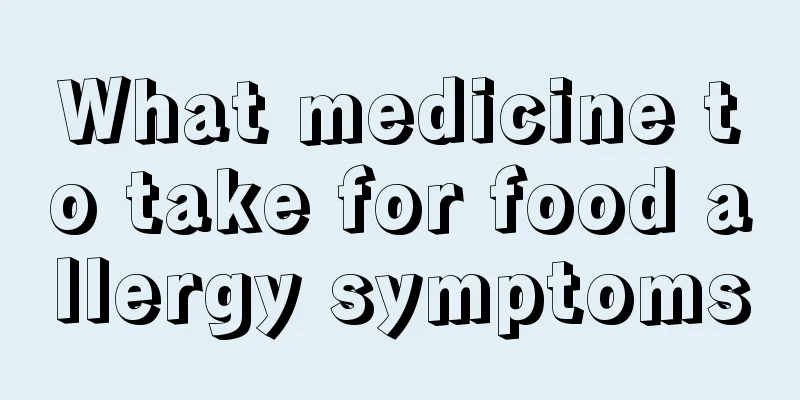What medicine to take for food allergy symptoms

|
Food allergy is a common phenomenon because people cannot predict which foods they will encounter in their lives that will cause allergic symptoms. However, once an allergy is discovered, timely treatment is required, otherwise it will affect your health. Usually, many people will choose to take medicine to treat food allergies, but the decision needs to be made based on their actual situation. So what medicine should be taken for food allergy symptoms? 1. Symptoms of food allergy Skin symptoms, such as itching, redness, swelling, etc.; Gastrointestinal symptoms, such as abdominal pain, nausea, vomiting, diarrhea, itching and swelling in the mouth; Respiratory symptoms, such as itching, swelling, and wheezing of the nose and throat; Itchy and swollen eyes; Cardiovascular symptoms such as chest pain, irregular heartbeat, low blood pressure, fainting, and even death. 2. What medicine should I take for food allergies? 1. Antihistamines. This is the most commonly used anti-allergy medication and is best used for type 1 allergic reactions. Commonly used ones include diphenhydramine, isoproterenol, chlorpheniramine, cyproheptadine, astemizole, and terfilin. This type of drug is an H1 receptor blocker. Because it has a similar chemical structure to histamine, it can compete with it to antagonize histamine receptors. It has a good therapeutic effect on skin and mucous membrane allergic reactions, and is effective for skin itching and edema caused by insect bites. It is also effective for urticaria caused by serum sickness, but is ineffective for those with joint pain and high fever. It has a poor effect on bronchial asthma. Dosage should be individualized, and drivers or machine operators should avoid using central nervous system 2. Allergic reaction mediator blockers, also known as mast cell stabilizers, while working. This type of drugs mainly includes sodium cromoglycate (Yantai), sodium hydroxypropyl ketotifen (mepiprofen), etc. It is mainly used to treat allergic rhinitis, bronchial asthma, ulcerative colitis and allergic dermatitis. 3. Calcium supplement. It can increase the density of capillaries, reduce permeability, thereby reducing exudation and alleviating or relieving allergic symptoms. It is often used to treat urticaria, eczema, contact dermatitis and serum sickness. Adjuvant treatment of allergic diseases such as angioedema. The main one is calcium gluconate. Calcium chloride, etc., is usually given intravenously and works quickly. There is a sensation of heat when calcium is injected, so it should be injected slowly. If the injection is too fast or the dose is too large, it may cause heart rhythm disorders, and in severe cases, it may cause ventricular fibrillation or cardiac arrest. 4. Immunosuppressants. It mainly has a nonspecific inhibitory effect on the body's immune function and is effective for all types of allergic reactions, but it is mainly used to treat refractory exogenous allergic reactions, autoimmune diseases and organ transplantation. This type of drug mainly includes adrenal cortical hormones, such as prednisone, dexamethasone, as well as cyclophosphamide, thiothiazide, etc. |
<<: What are the symptoms of finger synovitis
>>: What causes teeth to grow inwards?
Recommend
How to use dental floss stick
Dental floss sticks may be a spare item in every ...
How to check for endometrial cancer at the hospital
In our clinical medicine, each disease has its re...
How to kiss for the first time
Many people are kissing someone for the first tim...
How to prevent epidemic meningitis?
How to prevent epidemic meningitis? Try not to st...
What are the foods that nourish the stomach and protect the liver
Problems with any organ in the body will make us ...
Does thyroid cancer recur in a single patient?
Whether a single thyroid cancer is prone to recur...
What are the symptoms of liver cancer? These 5 symptoms are the symptoms of liver cancer
What are the symptoms of liver cancer? The main s...
How to treat supraventricular tachycardia, four methods can help you
Supraventricular tachycardia is a common disease ...
Does skin cancer itch?
Does skin cancer itch? If skin cancer develops re...
What ointment is good for acne
It is best not to squeeze pimples with your hands...
How to avoid motion sickness?
When you go out, you often have to take a car, esp...
Serrated adenoma of the colon
The colon is a part of the human intestinal tract...
What are the treatment options for thyroid cancer
What are the options for thyroid cancer treatment...
What should I eat if I have kidney deficiency and insufficient qi and blood? 6 kinds of food to help women replenish qi and blood
In daily life, many female friends will have symp...
At what age is colorectal cancer most likely to occur
The incidence of colorectal cancer is still risin...









